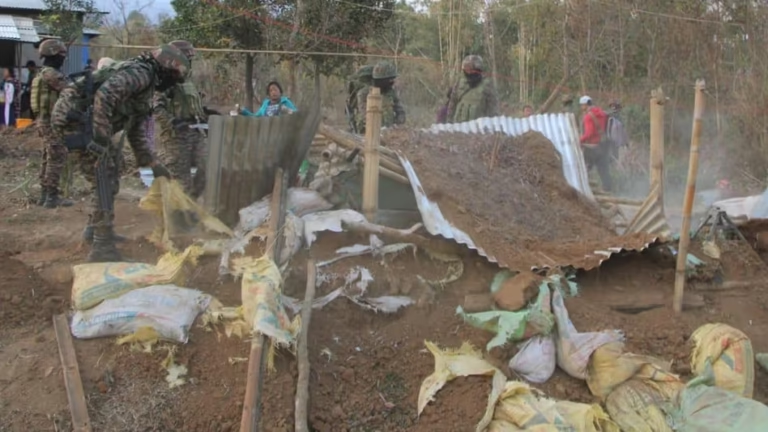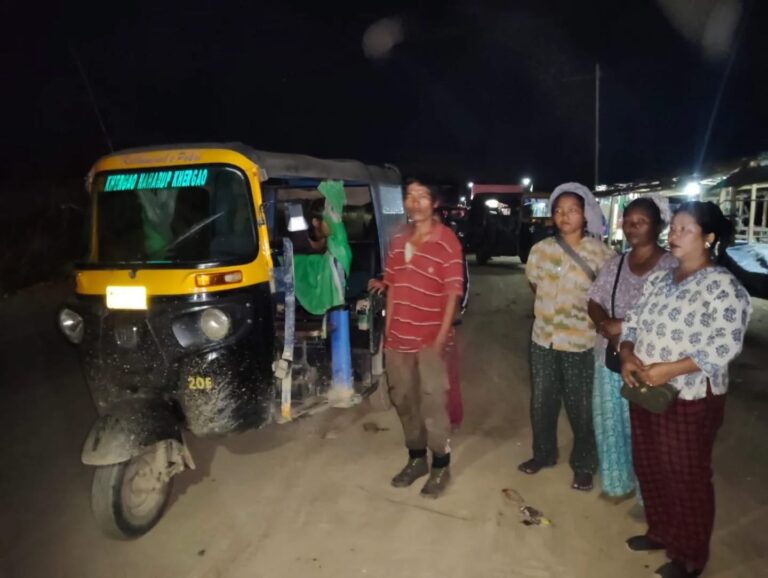Tragic Loss: Army Jawan Dies by Suicide in Manipur’s Bishnupur District
Summary
A young Indian Army jawan from Maharashtra tragically died by suicide while stationed in Bishnupur, Manipur. The soldier was on duty in the conflict-affected region, and his death raises concerns about the mental health struggles faced by military personnel in high-stress environments. Authorities are investigating the circumstances of his death, emphasizing the need for mental health support within the armed forces.
Full Article
Introduction: The Human Cost of Service in High-Conflict Zones
Serving in the military comes with unique challenges. For soldiers stationed in conflict-prone regions, like Manipur, stress and isolation can create significant mental health pressures. Recently, a jawan from Maharashtra stationed in Bishnupur tragically died by suicide. This incident is a reminder of the unseen struggles our soldiers face while performing their duties. Let’s dive deeper into this sensitive topic, examining what led to this tragic event, the challenges military personnel encounter, and the importance of mental health support in such high-stress roles.
The Incident in Bishnupur: A Tragic Reminder
The soldier’s death highlights the persistent mental health crisis within India’s armed forces, especially for those deployed in volatile areas. Serving in regions with ethnic or civil conflict, like Manipur, adds layers of stress beyond physical danger. The jawan, originally from Maharashtra, was assigned to a sensitive zone in Bishnupur, an area grappling with instability. While investigations are ongoing, authorities suspect mental strain as a contributing factor, underscoring the toll such assignments can take on even the most resilient soldiers.
The Mental Health Landscape in the Indian Armed Forces
1. Daily Stressors and High-Stakes Pressure
Military service, particularly in conflict areas, is often romanticized for its bravery and sacrifice. But behind the courage lies a daily grind of stressors—long hours, physical fatigue, isolation from loved ones, and constant vigilance. It’s a demanding environment where mental health can easily deteriorate if left unaddressed.
2. Isolation from Family and Community
For soldiers stationed far from home, the lack of family and community support can be devastating. Communication with loved ones is often limited, making it hard to cope with loneliness or homesickness. Soldiers can find themselves struggling to process their emotions without a support system, leading to feelings of hopelessness.
3. Stigma Around Mental Health in the Armed Forces
Unfortunately, discussing mental health remains taboo in the military, both in India and globally. Soldiers are often encouraged to ‘tough it out,’ with vulnerability seen as a sign of weakness. This stigma can prevent those in need from seeking help, creating a culture where emotional distress is downplayed until it’s too late.
Current Support Systems and Their Gaps
1. Existing Programs for Soldiers’ Well-being
The Indian Army has started mental health initiatives in recent years, including counseling programs, regular wellness checks, and helplines for personnel. However, these resources are limited in reach, and many soldiers find it challenging to access them, especially when deployed in remote or conflict-ridden regions like Manipur.
2. Need for Trained Mental Health Professionals on Duty
While counseling options exist, there’s a shortage of trained mental health professionals within the armed forces. Deploying psychologists or counselors directly within military units stationed in high-stress areas could provide immediate support for soldiers struggling with their mental health, yet these measures are not universally implemented.
3. Creating a Safe Environment for Mental Health Conversations
One of the biggest challenges is fostering a culture where soldiers feel safe seeking help. In a profession that prioritizes toughness, it’s essential to normalize mental health care, allowing soldiers to discuss their issues without fear of judgment or repercussions on their careers.
The Broader Impact of Military Suicide
When a soldier dies by suicide, the impact ripples through families, fellow servicemen, and the broader community. Families are left heartbroken, often without closure, and colleagues may experience feelings of guilt or helplessness. Furthermore, these incidents can erode morale within the ranks, as soldiers witness the mental toll that service can take on their peers.
Moving Forward: Strategies to Support Soldiers in Conflict Zones
1. Proactive Mental Health Screening and Training
Before deployment, soldiers should undergo mental health assessments to identify those at risk. Mental resilience training can also equip soldiers with coping mechanisms to manage stress while on duty. Regular check-ins during their deployment could prevent minor issues from escalating into crises.
2. Building Peer Support Networks
Developing strong peer support within units can help soldiers feel they’re not alone. By fostering a buddy system where soldiers look out for one another, the military can create an environment where mental health concerns are identified early, making it easier for soldiers to seek help.
3. Collaboration with Civilian Mental Health Experts
Bringing in external mental health professionals with experience in trauma can provide soldiers with specialized care. Partnerships between military and civilian mental health services could provide a broader support network for soldiers, ensuring they have access to the resources they need.
4. Expanding Family Communication and Support
Allowing soldiers more frequent communication with family can ease feelings of isolation. The emotional comfort of speaking to a loved one can make a world of difference for someone facing high-stress conditions. Developing programs to connect families with mental health professionals can also help families support their loved ones better.
5. Raising Awareness and Reducing Stigma Through Education
Educational programs within the armed forces can break down mental health stigma, making it clear that seeking help is not a sign of weakness but of strength. When soldiers understand that their mental well-being is as important as physical health, they’re more likely to access the resources available to them.
Conclusion: Prioritizing Mental Health as a Vital Aspect of Service
The tragic loss of the jawan in Bishnupur serves as a painful reminder of the mental health crisis that continues to affect the armed forces. As India’s military addresses these concerns, it’s essential to prioritize mental health as an integral part of soldier well-being. Only by fostering a culture of openness, providing accessible support, and equipping soldiers with the tools to handle stress, can we prevent further tragedies and honor the sacrifices our soldiers make daily.
FAQs
- Why is mental health important for soldiers in conflict zones?
Mental health is crucial as soldiers in conflict zones face unique stressors that can lead to severe mental strain, affecting their ability to perform and cope. - What challenges do soldiers face regarding mental health?
Isolation, high-stakes pressure, limited support, and stigma around seeking help are common challenges that exacerbate mental health struggles. - Are there mental health programs for soldiers in the Indian Army?
Yes, the Indian Army has initiated counseling programs and helplines, but accessibility and reach are still limited, especially in remote or high-conflict zones. - How can the military reduce the stigma around mental health?
Education, open conversations, and mental health training within units can help reduce stigma, encouraging soldiers to seek support when needed. - What role does family support play for soldiers?
Family communication offers emotional relief, reduces isolation, and strengthens soldiers’ resilience, providing a vital support system while they’re deployed.




